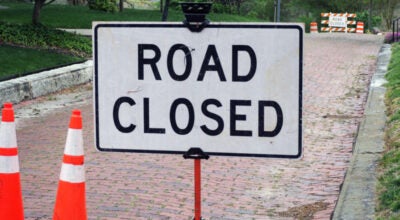Trial date set for stormwater lawsuit
Published 6:42 pm Tuesday, June 29, 2021
Carrollton resident Otis Brock, who’s suing Isle of Wight County over a collapsed stormwater pipe that’s been washing away his yard since 2018, will have to wait until 2022 for his day in court.
The matter will go to trial April 5, 2022, at 10 a.m. per a recent court order. The case is being tried in Norfolk’s federal court, since Brock and co-plaintiffs Brian and Sue Fernaays are alleging violations of their Fifth and 14th Amendment rights under the U.S. Constitution, which prohibit government entities from taking private property without due process or compensating the owners if said property is taken for public use. They’re also alleging a violation of the Constitution of Virginia, which states private property shall not be taken “or damaged for public use without just compensation.”
The lawsuit argues the county has taken and damaged Brock’s and the Fernaayses’ properties by not repairing a collapsed pipe located in a 20-foot easement spanning 10 feet into both yards to provide stormwater retention and drainage for nearby public roads. The neighbors blame the pipe for the runoff that comes rushing through the broken pipe whenever it rains and the resulting sinkhole that’s grown into a 12-foot-deep, 20-foot-wide chasm spanning the property line.
The county, however, argues it doesn’t own the easement, and refers to easements that lack clearly defined owners like the one spanning the Brock-Fernaays property line as “orphaned outfalls.” County staff authored a position paper in October 2019 — intended for the Virginia Association of Counties — which argues that while modern development regulations now require such easements to be dedicated to a development’s homeowners association, subdivisions built out in the 1990s and prior frequently lack a stated designee responsible for the stormwater system’s upkeep. The development’s builder or a homeowners association “was the implicit beneficiary,” the paper argues, but in cases where such associations are now defunct or never existed “an unanticipated and costly asset remains.”
In 2016, Isle of Wight successfully negotiated with the state Department of Environmental Quality to be released from its municipal separate storm sewer system (MS4) permit obligations, arguing that it did not own or operate a municipal stormwater system. This allowed county staff to cut the stormwater fee it adds to the real estate tax bills of residents and businesses by about 25% — dropping it from $72 to roughly $53 per year for most county residents. If the county were to acknowledge municipal ownership of a stormwater system or agree to maintain or repair privately-owned stormwater outfalls, it would run the risk of once again being subject to an MS4 permit — and potentially would need to increase its stormwater fee to cover its repair and maintenance obligations, the paper argues.
Brock and the Fernaayses aren’t alone either, though to date they’re the only ones who’ve sued. According to Assistant County Administrator Don Robertson, Isle of Wight had received a total of 28 similar complaints as of November 2020 involving outfall pipes.
The lawsuit asks the court to decree Isle of Wight County took and damaged private property rights without payment and that a jury award “just compensation,” plus legal and expert fees and costs, an award of pre-judgment and post-judgment interest and “any other relief as necessary to obtain the interests of justice.”





